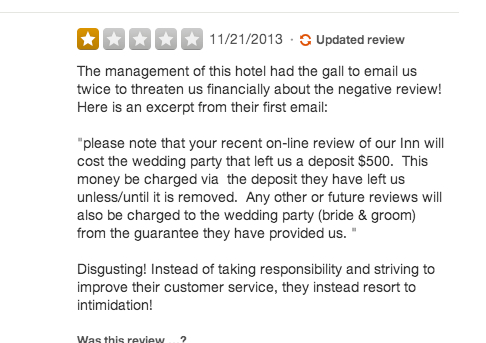What Can This Small Business #Fail Teach Retailers?

Subscribe to our newsletter
Back when I was looking to move away from the crowded, noisy, dusty freeways of Los Angeles, I checked out the green Mid-Hudson Valley of New York. While there were no Westins in that part of the world, I did discover a great off-the-beaten-path alternative, the Union Street Guest House in Hudson.
A large, spacious suite was outfitted just right. Their location was superb for walking, and the excellent local restaurants kept me from using the fully functional kitchen in my suite.
Over the years, I’ve recommended that place to many visitors, and I even posted a review on TripAdvisor in 2008. But you won't find it open for business today.
Imagine my surprise when I read that the establishment mentioned in this headline, “Hotel fines $500 for every bad review posted online” was the Union Street Guest House.
Seems they posted a policy online regarding weddings which read in part, “If you have booked the inn for a wedding or other type of event . . . and given us a deposit of any kind . . . there will be a $500 fine that will be deducted from your deposit for every negative review . . . placed on any internet site by anyone in your party.”
It went on…
“If you take down the nasty review, you’ll get your money back."
Oh, dear...
The inn was saying, if you hurt us, we’ll hurt you back.
But that’s not all…
Once that article was posted, hundreds of people took to Yelp.com to deride the proprietors with mostly fake reviews.
For those of you smugly saying, what a terrible thing for a business to do, what do you think is at the core of this issue?
The property itself?
The staff?
The proprietors?
I think it is the customers.
Look, this hotel knows it is not the Four Seasons. It knows it doesn’t have a bar. It knows it doesn’t have a restaurant, a concierge, or a pool. It knows it is a small property...
That it is a step back in time.
Its proprietors knew enough to warn their brides and grooms with, “Please know that even though wedding couples love Hudson and our inn, your friends and families may not.”
They knew that, in reality, customers are quick to complain both in person and online. And they posted the warning to try to stop bitchy relatives, who may not have appreciated the quaintness of the inn, from doing just that.
I can understand a business wanting to set expectations. Having worked in hospitality, I know large parties can be a nightmare.
I remember one time when a woman made a reservation for a suite at our hotel. As she checked in, she said she’d be back in a couple of days as eight teenagers descended from her SUV. The manager told her right then and there, “This isn’t a party hotel. We’ll give them one warning before calling the cops if there are any disturbances. If the cops come, no matter what time of day, we’ll charge you the full amount; they will be kicked out and have nowhere to go. If you want to leave now, that’s fine, but if you want to stay, those are the rules.” They stayed. Luckily, they didn’t have an incident.
Our manager discouraged her as an individual. Our hotel hadn’t posted a blanket statement aimed at all people with children. It hadn’t threatened all future guests with dire consequences.
The Union Guest House had.
And when I checked their TripAdvisor and Yelp reviews, I did find negative reviews.
So yesterday, I wrote the Guest House, and they responded that they have never charged a guest $500 for a negative review.
But it did not stop them from threatening, as this review on Yelp from last fall confirms.
The publicity from the Page Six article will probably quiet down. Probably. In fact, the owner has now issued a lengthy apology.
But what does this say about consumers when merchants feel they have to protect their companies by going to such lengths?
I should say right here that I think the inn was wrong to have even come up with such a policy, whether it was a joke or not, let alone put it on their website.
 But independents are …well…independent. It’s their business, and if they want to give off the attitude to take it or leave it, that is their call.
But independents are …well…independent. It’s their business, and if they want to give off the attitude to take it or leave it, that is their call.
It’s why many independent retailers close at 5 pm during the week or stay closed on Sunday – and yet wonder why no one shops downtown.
Or those owners who park their cars in front of their stores, feed the meters all day, deprive their customers of convenient parking, and yet wonder why their customers complain about no parking.
It’s why you still see signs in shops, You break it, you buy it.
It’s why you run into boutiques with signs like the one above – then hear them complaining they can’t attract customers.
It’s why you find many poor customer service excuses – the merchant thinks it’s all about them.
Well, it is… in a way.
Let's go back to the Guest House. Check out this post on TripAdvisor:
Over 700 people found this review helpful. That means a significant number of those 763 people probably chose not to stay there. Numbers like that definitely affect how well you attract customers and your profitability.
The Point
Online reviews aren’t really the issue. It is the words you use that matter. How you use welcoming or threatening words is up to you. Implying a threat is not the way to go. Customers can and will simply choose somewhere else to spend their money.
When you are creating signs, postings, and web pages, look at the wording and see if it really states what you mean to say and do.
For example, do you think that Visa wouldn't laugh and issue a chargeback immediately if the innkeepers traced a bad review back to a wedding party and then charged the bride $500? Of course, they would.
So what was the point of coming up with such a policy in the first place? I expect this because someone at the inn wanted to get a handle on the situation and didn’t realize how such a thing could blow back in their face.
As a retailer, you may feel powerless against online reviews, but it would be better to set the right expectations one-on-one than think you are saving your time and energy by trying to control naysayers.
Don’t make it about damage control. Your focus should always be on creating a better experience for the customer all around.



